- Home
- James Y. Bartlett
Death is a Two-Stroke Penalty
Death is a Two-Stroke Penalty Read online
Title Page
Also by James Y. Bartlett
A Hacker Golf Mystery
Death is a Two-Stroke Penalty
Death from the Ladies Tee
Death at the Member Guest
An Open Case of Death
P.G.A. Spells Death (Coming Soon)
Death in a Green Jacket
Death from the Claret Jug
Standalone
Caddiewampus: Looping for the Greats
Table of Contents
Title Page
Also By James Y. Bartlett
Dedication
Death is a Two-Stroke Penalty (A Hacker Golf Mystery, #1)
Chapter 1
Chapter 2
Chapter 3
Chapter 4
Chapter 5
Chapter 6
Chapter 7
Chapter 8
Chapter 9
Chapter 10
Chapter 11
Chapter 12
Chapter 13
Chapter 14
Chapter 15
Chapter 16
Chapter 17
Chapter 18
Chapter 19
Chapter 20
Chapter 21
Chapter 22
Chapter 23
Chapter 24
Chapter 25
Chapter 26
Chapter 27
Sign up for James Y. Bartlett's Mailing List
About the Author
TO SARAH ROSE AND CHRISTOPHER, AND ESPECIALLY FOR SUSAN, WHO SAVED MY LIFE
A child said What is the Grass? Fetching it to me with full hands;
How could I answer the child? I do not know what it is any more than he.
I guess it must be the flag of my disposition, out of hopeful green stuff woven.
Or I guess it is the handkerchief of the Lord, A scented gift and remembrance designedly
dropt.
Bearing the owner’s name someway in the corners, that we may see and remark, and say Whose?
And now it seems to me the beautiful uncut hair of graves.
--Walt Whitman, Song of Myself
Copyright Page
COPYRIGHT © 2004 BY James Y. Bartlett
Yeoman House Books paperback edition 2004
E-book edition first published 2010.
All rights reserved.
This Yeoman House ebook edition is an original publication. It is published by arrangement with the author.
THIS EDITION HAS BEEN revised from the original hardcover edition published in 1991 by Thomas Dunne Books, an imprint of St. Martin’s Press.
This is a work of fiction. All of the events, characters, names and places depicted in this novel are entirely fictitious or are used fictitiously. No representation that any statement made in this novel is true or that any incident depicted in this novel actually occurred is intended or should be inferred by the reader.
No part of this book may be used or reproduced in any manner whatsoever without written permission except in the case of brief quotations embodied in critical articles or reviews. For information, address Yeoman House Publishers, 10 Old Bulgarmarsh Road, Tiverton, RI 02878.
Cover Design: Lissett Feliz
Printed in the USA. ISBN 0-9754676-0-3
Library of Congress Control Number: 2004092268
Chapter 1
THE NOISE BEGAN AS soon as Mark Cranmer struck his uphill, slightly curving twelve-foot putt. The twenty-five thousand or so people gathered around the eighteenth green of the Atlanta Country Club on this hot Sunday afternoon in June who had held their breath in unnatural silence just a moment before, now began to murmur as Cranmer’s putt started to roll. The murmurs turned to aahhs as the putt took the slight left-to-right break and then to tumultuous roars as the white ball dropped squarely in the middle of the hole.
To the assembled multitude, the birdie putt meant that Mark Cranmer had won the Atlantic Classic by two shots over Tim Kite. Since Cranmer hailed from nearby Augusta, that made many of them very happy. I wondered what the victory meant to Cranmer. With the birdie he had won $125,000, a two-year exemption from qualifying for other tournaments, an invitation to next year’s Masters in his hometown, and a certain amount of fleeting fame.
But I wondered if he felt any innate satisfaction of achievement. Of having marshaled his energies over the last four days, controlling mind and muscle to the desired effect. Of having confronted, battled and mastered his personal demons. Probably too much to hope for, I thought as I turned with a sign to head back to the pressroom.
Bob Goldberg, the balding, bespectacled golf writer for the Associated Press, burst through a crowd of fans. I fell into step beside him as we moved toward the clubhouse.
“Hacker,” he nodded at me. “Cranmer really showed me something on the back nine today, y’know?” He looked at me for confirmation.
I thought about telling him that it troubled me to watch a twenty-four-year-old kid in his second year on the tour make four birdies on the last five holes and enjoy it for all the wrong reasons, but I figured he’d never understand. I settled for “You bet.”
Goldberg dashed off. He had about ten minutes to summarize the salient facts of the weekend’s events at the Atlanta Country Club into perhaps five graphs and send it out on the wire to help fill the gaping maw of a news-hungry nation. I did not envy him his task.
I wouldn’t have to file my story for another hour or so, and in the mood I was in, I knew better than to try and write it now anyway. I write for the Boston Journal, “Hacker on Tour,” two columns a week. I did not come up with the name. Thursday morning’s piece previewed the tournament about to commence. Sunday’s column was a catchall gossip piece on the various tours: men’s, ladies’ and seniors’. My editor also expected a bylined piece on the winner of that weekend’s PGA tournament for Monday’s paper, but usually ended up running the AP wire story roundup somewhere on page 6 or 7 instead. Though golf is played by thousands of Bostonians, the readers of the Journal are more interested in reading about the just concluded season of the Celtics, the usual swan-drive season of the Red Sox and the nascent beginnings of the Patriot’s fall campaign. Not to mention the results of today’s stirring yacht races off Marblehead
Sighing again, I entered the welcome cacophony of the tournament pressroom. There were about two dozen people there. About half a dozen were writing. Another dozen were standing around in groups studying the huge scoreboard that covered one wall of the room. Off in another corner, a film crew from a local television station was doing video bites: The blond newsman, dressed in an absurd cerulean blue blazer, held the microphone to his lips and said “Pease porridge hot, pease porridge cold” and then held the microphone out to an invisible interviewee, all the while looking incredibly earnest and interested. Back at the studio, they would record a voiceover, patch in the video, and cut to a response from the winner, Mark Cranmer. Film at eleven.
I grabbed a beer from the cooler at the front of the room and sank heavily into my chair. Taking a deep pull from the can, I allowed myself the not intolerable pleasure of watching Suzy Williams post the final scores on the pressroom scoreboard. Suzy, the PGA Tour’s incredibly efficient assistant press officer, was a statuesque blond dressed today in a lovely pink halter and white shorts that showed off all her wonderful curves. Posting the scores was an athletic task. The board covered the entire wall, with hook-and-eye hanging numbers tallying the hole-by-hole score for each player: red numbers for birdies, green for eagles, black for bogies and blue for pars. The players were listed alphabetically, so posting the scores required quite a bit of bending and stretching for Suzy. For that, I was quite thankful.
Bill Didrickson, the stringer for Sports Illustrated, was yelling into his telephone. “Cranmer. Mark Cranmer. Second-year pro. First win. Yes, he’s blond. No, he’s not a clone. He charged, goddammit, charged! Just like Arnie used to do.” Didrickson listened for a second, then slammed the phone down. He looked over at me with a bemused expression.
“Fuckin’ cretin said if Arnie won the tournament, it would be worth front of the book,” he said. “Said America doesn’t give a damn about another blond first-time winner from nowhere winning a hundred grand. The bitch of it is, he’s right.” He turned back to his word processor and began to beat on the keys.
I studied the day’s scores for a few minutes, making some notes. Then I grabbed another beer and ambled across the hall to the interview room. Several rows of folding chairs faced a skirted table set on a small riser. Billy Corcoran was passing out bio sheets on Mark Cranmer, who sat sipping a soft drink behind the table. He was blond, tanned, and grinning. I noticed some peach fuzz on his cheeks.
Corcoran returned to the table, picked up the microphone, and got the ball rolling. “So Mark, how’s it feel to have that first one under your belt?” he asked.
“Jeez, it’s just unbelievable,” Cranmer gushed. “It means so much to me. I mean, the money’s great, but —”. He paused to take another sip of his soft drink. Mentally I crossed my fingers. “To think that I’ll be invited to play in the Masters next year, and the Tournament of Champions... well, it just hasn’t sunk in yet. I should get some great endorsement deals now too. I’ll bet my sponsors are real happy.” Oh, boy, I thought to myself, and sighed.
“Tell us about your round, Mark,” Corcoran prodded. “Well, on number one, I hit driver, seven-iron to ten feet and just missed—”
I had heard it before and I had heard enough. I left.
I decided to drop into the players’ locker room and look for Jerry Pate. Pate, who as a young player had won the U.S. Open and the Players Championship, had suffered a severe shoulder injury that had stopped his playing career cold, and he had drifted into TV analyst work and had even done some course architecture work down in Florida. But in recent months he had been slowly working his way back onto the tour. He had played well this weekend, finishing in the top fifteen, and I thought he’d make good column material.
To get to the locker room, I had to walk outside, back into the steamy Atlanta afternoon. While most of the crowd had left, the hangers-on were hanging on. The corporate hospitality tents were in full swing, jammed with the elegantly dressed. I heard a four-piece combo belting out that old Atlanta favorite, “New York, New York.”
I followed the veranda of the clubhouse around to the side. As I rounded the corner, I saw a golfer and his caddy below me. The player had his back to me and was wearing navy slacks and a golf shirt of horizontal stripes that began in navy and went up through a purplish color spectrum, ending in chartreuse at the shoulders. I did not have to be a student of body language to know he was angry. His shoulders were tightly hunched, his neck was red, and he was pointing an accusing finger at the caddie.
I knew Jocko Moore, still wearing his white caddie coveralls, piped in green. Or rather, I knew of him. Like most caddies on tour, Jocko had a middle name, a handle, always framed in quotation marks. For some, this handle was a mark of honor, for others, a mild and harmless tweak of some personality trait. For yet others, the nickname hinted at a reputation. Jocko “Drugstore” Moore fell into the latter category.
In the late afternoon heat, Jocko’s long black hair was soaking wet and pushed back from his face. As he listened to the angry golfer, his eyes glared back, dark and angry. Dangerous- looking red spots had risen on his high cheekbones, and his chin was jutting out from what looked like three days of grizzled growth.
Ever the reporter, I swerved slightly to walk closer to the veranda railing, and slowed my pace.
“I warned you Jocko,” the golfer was saying. “I told you that if I ever heard about this again, you’d be fired. I did, and you are. I simply won’t put up with this. You’ll never carry my bag again.”
“Ah, spare me the sermon, reverend,” Jocko snarled back. Curious, I glanced down as I passed the two. Now that I could see the golfer from the side, I easily recognized him. John Turnbull was one of the group of “young lions” on tour whose stories were numbingly similar. An excellent collegiate player, he won several amateur titles, turned pro with “can’t miss” written all over him, and had immediately disappeared from view. The level of play on the PGA Tour, plus the difficulties of coping with life on the road, had swallowed many players like John Turnbull. But this one had struggled back after several years of anonymity. As I recalled, he had won an insignificant late- season tournament the previous year, had been lurking near the top in several early-season tournaments this year and had finally broken through, winning the Honda Classic in Florida in March. Turnbull had graduated from “can’t miss” to “up-and-comer.”
I paused at the top of the stairs leading down from the veranda to the locker room. Looking back at the tableau I had just passed, I saw Turnbull now had his hand on Jocko’s shoulder and was speaking earnestly to him. Jocko knocked the hand off angrily, pushed past him and stalked off.
I turned away and went into the locker room, nodding at the guard standing at the door. There were not many players left, late on this Sunday afternoon. The end of one tournament means the beginning of the next. Those who had played in the early part of the day, trying only to move up a few places and collect a bigger check, had long since gone. Even many of the afternoon players, those who had a chance t win, who had played in the searing heat of the day, in the pressure of the large crowds and the television cameras, had packed up quickly and left. Some would jet off to various points around the country to work a Monday morning corporate outing, pocketing a few thousand dollars for their trouble. Others would head for Charleston to prepare for next week’s event, the Carolinas Open. Still others would seek the quiet of their hotel rooms or the noise of the nearest bar, to try and forget all the bad shots of the weekend in the bottom of a bottle or in pursuit of a pretty girl.
I found Jerry Pate by his locker, packing up a leather satchel. He was talking shoulders with Hubert Green, a fellow Alabaman who had also suffered a shoulder injury in his career. I eased myself down on the wooden bench and listened to them drawl on about rotator cuffs and latissimus dorsis. Pate’s locker was open. I noticed it was stuffed almost full with boxes of Titleist golf balls, packages of new golf gloves and about four pairs of brand new golf shoes.
He saw me looking. “Amazin’, isn’t it?” he asked rhetorically. “I haven’t won shit out here for five years, haven’t been able to swing a club for months without yelling, but I show up here for a little experiment and there’s all this crap waitin’ on me. Must be five hundred bucks worth of merchandise in this locker, and the same in every locker. Goddam markup on golf balls must be pretty good for ‘em to give this crap away like this!”
Green chortled in agreement.
“So what do you think?” I asked. “How’d the experiment go?”
“I gotta be pleased,” Pate answered. “Got through four days without pain. Made a few putts. Get to take a fairly nice check home to the wife. Yeah, it’s comin’.”
“I followed you around for a few holes yesterday,” I said. “I noticed you were only hitting draws. Still a little hesitant to work it the other way?”
Pate started to answer, did a double-take, then broke into a grin. “Shit, Hacker, I forgot. You were a player once. I wondered there for a second what a shit-eatin’ golf writer knew about working the ball. Most of ‘em just
wanna know how you keep from wettin’ your pants trying to putt in front of forty thousand people. But you played this game once, didn’t you?”
Hubie Green chortled again. “Goddam right he played this game once. Beat my sorry ass black and blue in the North and South, Nineteen and Sixty-Eight. Remember that, Hacker?”
I nodded uncomfortably.
Pate looked at me, his clear blue eyes quizzical. “How come you quit, Hacker? You had the game, right? Coupla good years? Then, poof. How come?”
I paused. It was a question I had been asked many times. Even by myself. There were some good answers and some not so good ones, and trying to decide among them took more psychic energy than I could muster after a long hot afternoon in the Atlanta sun.
“Well, it was the U.S. Golf Association,” I said. Both men looked at me questioningly. “They forced me to retire. See, they knew I was gonna win the U.S. Open one day, and they couldn’t stand the thought of opening the newspaper on the next morning in reading the headline “Hacker Wins Open.”
It was an old joke, but, as usual, an effective one. Green and Pate collapsed in laughter.
Two hours later, I headed for the parking lot. Interview completed, story written and filed, weekend over. In the gloaming of the twilight, the golf course was strangely quiet. Piles of trash were heaped by waste receptacles. The bright yellow ropes that had held back the press of spectators still lined the fairways.
By morning, things would be pretty much back to normal. The Ladies Golf Society would have a nine-holer at 1 P.M. sharp. On Saturday, the men’s Lauderdale, shotgun start at 9:30 sharp. Next Sunday, the after-church brunch, service commencing promptly at 11:30 A.M. in the main dining room. Life would return to normal, if all that can be called normal.
Life had been anything but normal here for the last four days. One hundred and fifty men had struggled to win a piece of one million dollars. Half of them left town with nothing. A nice man had been afraid to swing a golf club a little differently for fear of ending his career again, this time for good. A young kid who didn’t know any better had reached what should have been one of the pinnacles of his young life in terms of achievement, but could only appreciate that achievement in terms of how much it paid off for him.

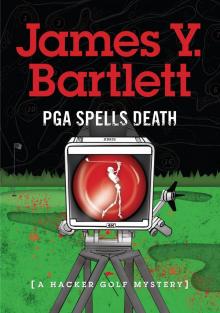 P.G.A. Spells Death
P.G.A. Spells Death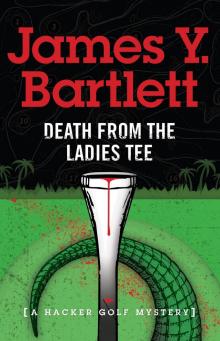 Death from the Ladies Tee
Death from the Ladies Tee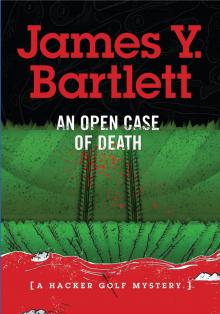 An Open Case of Death
An Open Case of Death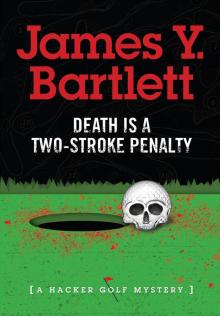 Death is a Two-Stroke Penalty
Death is a Two-Stroke Penalty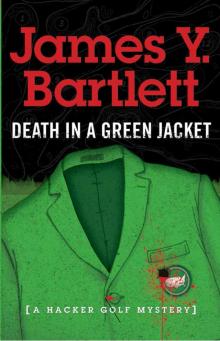 Death in a Green Jacket
Death in a Green Jacket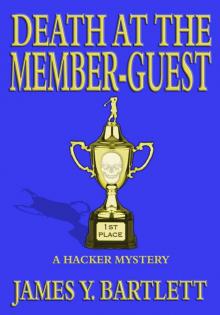 Death at the Member Guest
Death at the Member Guest